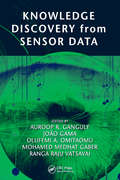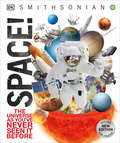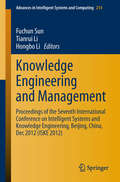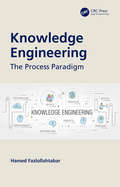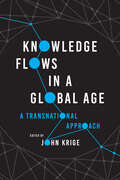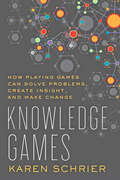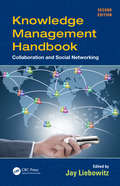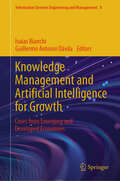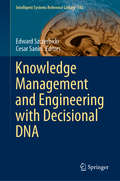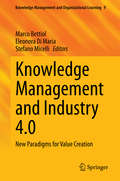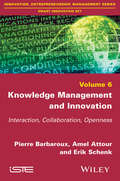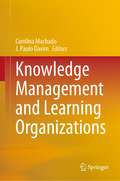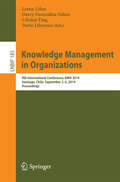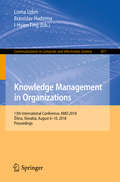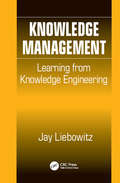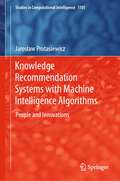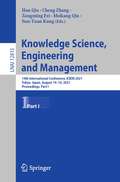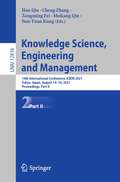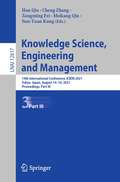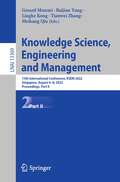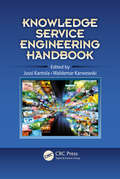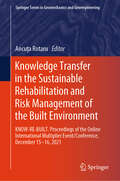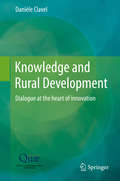- Table View
- List View
Knowledge Discovery from Sensor Data
by Mohamed Medhat Gaber Olufemi A. Omitaomu Ranga Raju Vatsavai Auroop R. Ganguly JoÎo GamaAs sensors become ubiquitous, a set of broad requirements is beginning to emerge across high-priority applications including disaster preparedness and management, adaptability to climate change, national or homeland security, and the management of critical infrastructures. This book presents innovative solutions in offline data mining and real-time
Knowledge Encyclopedia Space!: The Universe as You've Never Seen it Before (DK Knowledge Encyclopedias)
by DKA spacetastic new edition beaming with incredible pictures and the latest facts about the universe.From the origin of the universe to the future of space rockets, this book about space for kids has it all.Did you know that the moon was once a piece of the Earth, and that a day on Venus is longer than one year? First published in 2015, Knowledge Encyclopedia: Space! has been completely revised and updated for 2020, with new images and information on all things space-related to send you rocketing to the furthest reaches of the cosmos. Newly updated with the latest scientific discoveries and innovation in space engineering, this new title will answer all your questions about what lies beyond the night sky. Discover how stars and galaxies are formed, take a trip through the Milky Way, and explore the innards of the International Space Station in this incredible book that uses the latest computer-generated 3-D imagery, eye-catching photographs, gripping information, and explanatory diagrams to bring the wonders of the cosmos to life.Knowledge Encyclopedia: Space! is the big bang of space books, and it's just gotten bigger!
Knowledge Engineering and Management: Proceedings of the Seventh International Conference on Intelligent Systems and Knowledge Engineering, Beijing, China, Dec 2012 (ISKE #2012)
by Tianrui Li Hongbo Li Fuchun SunThese proceedings present technical papers selected from the 2012 International Conference on Intelligent Systems and Knowledge Engineering (ISKE 2012), held on December 15-17 in Beijing. The aim of this conference is to bring together experts from different fields of expertise to discuss the state-of-the-art in Intelligent Systems and Knowledge Engineering, and to present new findings and perspectives on future developments. The proceedings introduce current scientific and technical advances in the fields of artificial intelligence, machine learning, pattern recognition, data mining, knowledge engineering, information retrieval, information theory, knowledge-based systems, knowledge representation and reasoning, multi-agent systems, and natural-language processing, etc. Furthermore they include papers on new intelligent computing paradigms, which combine new computing methodologies, e.g., cloud computing, service computing and pervasive computing with traditional intelligent methods. By presenting new methodologies and practices, the proceedings will benefit both researchers and practitioners who want to utilize intelligent methods in their specific fields. Dr. Fuchun Sun is a professor at the Department of Computer Science & Technology, Tsinghua University, China. Dr. Tianrui Li is a professor at the School of Information Science & Technology, Southwest Jiaotong University, Chengdu, China. Dr. Hongbo Li also works at the Department of Computer Science & Technology, Tsinghua University, China.
Knowledge Engineering: The Process Paradigm
by Hamed FazlollahtabarKnowledge management is far-reaching. It can dramatically reduce costs such as costs of office work repetition, human resource retirement, information reuse, etc. Rather than "reinventing the wheel" and having it be a costly and inefficient activity, systematic reuse of knowledge can show substantial cost benefits immediately. This book shows how to develop process-oriented methodologies, covers both interorganizational and enterprises models, discusses how knowledge management can dramatically reduce costs and increase speed of response, presents a wide range of quantitative methods applied to various knowledge engineering problems, and offers several graphical presentations of models and processes. Academicians and practitioners in the area of knowledge management and engineering, especially managers in industries will fine this book useful. The material might also be useful in knowledge management graduate studies.
Knowledge Flows in a Global Age: A Transnational Approach
by John KrigeA transnational approach to understanding and analyzing knowledge circulation. The contributors to this collection focus on what happens to knowledge and know-how at national borders. Rather than treating it as flowing like currents across them, or diffusing out from center to periphery, they stress the human intervention that shapes how knowledge is processed, mobilized, and repurposed in transnational transactions to serve diverse interests, constraints, and environments. The chapters consider both what knowledge travels and how it travels across borders of varying permeability that impede or facilitate its movement. They look closely at a variety of platforms and objects of knowledge, from tangible commodities—like hybrid wheat seeds, penicillin, Robusta coffee, naval weaponry, seed banks, satellites and high-performance computers—to the more conceptual apparatuses of plant phenotype data and statistics. Moreover, this volume decenters the Global North, tracking how knowledge moves along multiple paths across the borders of Mexico, India, Portugal, Guinea-Bissau, the Soviet Union, China, Angola, Palestine and the West Bank, as well as the United States and the United Kingdom. An important new work of transnational history, this collection recasts the way we understand and analyze knowledge circulation.
Knowledge Flows in a Global Age: A Transnational Approach
by John KrigeA transnational approach to understanding and analyzing knowledge circulation. The contributors to this collection focus on what happens to knowledge and know-how at national borders. Rather than treating it as flowing like currents across them, or diffusing out from center to periphery, they stress the human intervention that shapes how knowledge is processed, mobilized, and repurposed in transnational transactions to serve diverse interests, constraints, and environments. The chapters consider both what knowledge travels and how it travels across borders of varying permeability that impede or facilitate its movement. They look closely at a variety of platforms and objects of knowledge, from tangible commodities—like hybrid wheat seeds, penicillin, Robusta coffee, naval weaponry, seed banks, satellites and high-performance computers—to the more conceptual apparatuses of plant phenotype data and statistics. Moreover, this volume decenters the Global North, tracking how knowledge moves along multiple paths across the borders of Mexico, India, Portugal, Guinea-Bissau, the Soviet Union, China, Angola, Palestine and the West Bank, as well as the United States and the United Kingdom. An important new work of transnational history, this collection recasts the way we understand and analyze knowledge circulation.
Knowledge Flows in a Global Age: A Transnational Approach
by John KrigeA transnational approach to understanding and analyzing knowledge circulation. The contributors to this collection focus on what happens to knowledge and know-how at national borders. Rather than treating it as flowing like currents across them, or diffusing out from center to periphery, they stress the human intervention that shapes how knowledge is processed, mobilized, and repurposed in transnational transactions to serve diverse interests, constraints, and environments. The chapters consider both what knowledge travels and how it travels across borders of varying permeability that impede or facilitate its movement. They look closely at a variety of platforms and objects of knowledge, from tangible commodities—like hybrid wheat seeds, penicillin, Robusta coffee, naval weaponry, seed banks, satellites and high-performance computers—to the more conceptual apparatuses of plant phenotype data and statistics. Moreover, this volume decenters the Global North, tracking how knowledge moves along multiple paths across the borders of Mexico, India, Portugal, Guinea-Bissau, the Soviet Union, China, Angola, Palestine and the West Bank, as well as the United States and the United Kingdom. An important new work of transnational history, this collection recasts the way we understand and analyze knowledge circulation.
Knowledge Games: How Playing Games Can Solve Problems, Create Insight, and Make Change (Tech.edu: A Hopkins Series on Education and Technology)
by Karen SchrierAre games the knowledge-producers of the future?Imagine if new knowledge and insights came not just from research centers, think tanks, and universities but also from games, of all things. Video games have been viewed as causing social problems, but what if they actually helped solve them? This question drives Karen Schrier’s Knowledge Games, which seeks to uncover the potentials and pitfalls of using games to make discoveries, solve real-world problems, and better understand our world. For example, so-called knowledge games—such as Foldit, a protein-folding puzzle game, SchoolLife, which crowdsources bullying interventions, and Reverse the Odds, in which mobile game players analyze breast cancer data—are already being used by researchers to gain scientific, psychological, and humanistic insights.Schrier argues that knowledge games are potentially powerful because of their ability to motivate a crowd of problem solvers within a dynamic system while also tapping into the innovative data processing and computational abilities of games. In the near future, Schrier asserts, knowledge games may be created to understand and predict voting behavior, climate concerns, historical perspectives, online harassment, susceptibility to depression, or optimal advertising strategies, among other things.In addition to investigating the intersection of games, problem solving, and crowdsourcing, Schrier examines what happens when knowledge emerges from games and game players rather than scientists, professionals, and researchers. This accessible book also critiques the limits and implications of games and considers how they may redefine what it means to produce knowledge, to play, to educate, and to be a citizen.
Knowledge Management Handbook: Collaboration and Social Networking, Second Edition
by Jay LiebowitzRecent research shows that collaboration and social networking foster knowledge sharing and innovation by sparking new connections, ideas, and practices. Yet these informal networks are often misunderstood and poorly managed. Building on the groundbreaking, bestselling first edition, Knowledge Management Handbook: Collaboration and Social Networkin
Knowledge Management and Artificial Intelligence for Growth: Cases from Emerging and Developed Economies (Information Systems Engineering and Management #8)
by Isaias Bianchi Guillermo Antonio DávilaThis book delves into the intersection of Knowledge Management (KM) and Artificial Intelligence (AI). It explores their applications, challenges, and opportunities across various industries and regions. The approach is comprehensive, drawing insights from experts worldwide. The book offers fresh perspectives on using KM and AI as powerful tools for driving business success. It covers research opportunities, real-world case studies, and empirical investigations. Notably, it emphasizes the unique context of knowledge management in the southern hemisphere. The book spans a broad range of subjects, including knowledge absorption capacity as an internationalization driver, quality certification methods in the health sector, and the role of intellectual capital in Argentine tech companies. It also delves into machine learning techniques for property price estimation in Brazil and identity document verification in Peru. Professionals, scholars, and policymakers navigating the complex integration of KM and AI will find this book invaluable. By combining theoretical foundations with practical findings, it equips readers with the knowledge and tools needed for sustainable growth within their organizations.
Knowledge Management and Engineering with Decisional DNA (Intelligent Systems Reference Library #183)
by Edward Szczerbicki Cesar SaninThis is the first book on experience-based knowledge representation and knowledge management using the unique Decisional DNA (DDNA) technology. The DDNA concept is roughly a decade old, and is rapidly attracting increasing attention and interest among researchers and practitioners. This comprehensive book provides guidelines to help readers develop experience-based tools and approaches for smart engineering of knowledge, data and information. It does not attempt to offer ultimate answers, but instead presents ideas and a number of real-world case studies to explore and exemplify the complexities and challenges of modern knowledge engineering issues. It also increases readers’ awareness of the multifaceted interdisciplinary character of such issues to enable them to consider – in different ways – developing, evaluating, and supporting smart knowledge engineering systems that use DDNA technology based on experience.
Knowledge Management and Industry 4.0: New Paradigms for Value Creation (Knowledge Management and Organizational Learning #9)
by Eleonora Di Maria Marco Bettiol Stefano MicelliThe book discusses the opportunities and challenges of managing knowledge in the new reality of Industry 4.0. Addressing paradigmatic changes in value creation due to the development of digital technologies applied to manufacturing (additive manufacturing, IoT, robotics, etc.), it includes theoretical and empirical contributions on how Industry 4.0 technologies allow firms to create and exploit knowledge. The carefully selected expert contributions highlight the potential of these technologies in acquiring knowledge from a larger number of sources and examine approaches to innovation, organization of activities, and stakeholder development in the context of this next industrial revolution.
Knowledge Management and Innovation: Interaction, Collaboration, Openness
by Amel Attour Pierre Barbaroux Erik SchenkThis book explores the relationships between knowledge management (KM) processes and innovation management. The geographical extension of markets and intensification of competition have led firms to experiment with novel approaches to innovation. New organizational forms emerged in which firms collaborate with various stakeholders to create, absorb, integrate and protect knowledge. This book explores how knowledge management processes evolve with firms' implementation of interactive, collaborative and open innovation models and it identifies the various knowledge types and processes involved throughout the different phases of the innovation process. The authors provide operational typologies for understanding innovative firms' capabilities and knowledge management practices and also discuss the main properties of four models of interactive innovation, namely open innovation, user-centric innovation, community-based innovation and crowdsourcing.
Knowledge Management and Learning Organizations
by J. Paulo Davim Carolina MachadoThis book focuses on knowledge management and learning organizations, showing how they realise entrepreneurship and innovation. Understanding knowledge management as the process of creating, sharing and managing an organization’s information and knowledge, and focusing learning organizations in their collaborations to promote continuous learning are two issues that are critical to the organizational success. As such, this book offers insights into the topic and the appropriate use of the tools and strategies that drive competitive organizations operating on an international or transnational scale.
Knowledge Management in Organizations
by Lorna Uden I-Hsien Ting Darcy Fuenzaliza Oshee Dario LiberonaThis book contains the refereed proceedings of the 9th International Conference on Knowledge Management in Organizations (KMO) held in Santiago, Chile, during September 2014. The theme of the conference is "Knowledge Management to Improve Innovation and Competitiveness through Big Data. " The KMO conference brings together researchers and developers from industry and academia to discuss and research how knowledge management using big data can improve innovation and competitiveness. The 39 contributions accepted for KMO 2014 were selected from 89 submissions and are organized in sections on: big data and knowledge management, knowledge management practice and case studies, information technology and knowledge management, knowledge management and social networks, knowledge management in organizations, and knowledge transfer, sharing and creation.
Knowledge Management in Organizations: 13th International Conference, KMO 2018, Žilina, Slovakia, August 6–10, 2018, Proceedings (Communications in Computer and Information Science #877)
by Lorna Uden I-Hsien Ting Branislav HadzimaThis book contains the refereed proceedings of the 13th International Conference on Knowledge Management in Organizations, KMO 2018, held in Žilina, Slovakia, in August 2018. The theme of the conference was "Emerging Research for Knowledge Management in Organizations."The 59 papers accepted for KMO 2018 were selected from 141 submissions and are organized in topical sections on: Knowledge management models and analysis; knowledge sharing; knowledge transfer and learning; knowledge and service innovation; knowledge creation; knowledge and organization; information systems and information science; knowledge and technology management; data mining and intelligent science; business and customer relationship management; big data and IoT; and new trends in IT.
Knowledge Management: Learning from Knowledge Engineering
by Jay LiebowitzKnowledge Management (KM) is strongly rooted in the discipline of Knowledge Engineering (KE), which in turn grew partly out of the artificial intelligence field. Despite their close relationship, however, many KM specialists have failed to fully recognize the synergy or acknowledge the power that KE methodologies, techniques, and tools hold for enh
Knowledge Recommendation Systems with Machine Intelligence Algorithms: People and Innovations (Studies in Computational Intelligence #1101)
by Jarosław ProtasiewiczKnowledge recommendation is an timely subject that is encountered frequently in research and information services. A compelling and urgent need exists for such systems: the modern economy is in dire need of highly-skilled professionals, researchers, and innovators, who create opportunities to gain competitive advantage and assist in the management of financial resources and available goods, as well as conducting fundamental and applied research more effectively.This book takes readers on a journey into the world of knowledge recommendation, and of systems of knowledge recommendation that use machine intelligence algorithms. It illustrates knowledge recommendation using two examples. The first is the recommendation of reviewers and experts who can evaluate manuscripts of academic articles, or of research and development project proposals. The second is innovation support, which involves bringing science and business together by recommending information that pertains to innovations, projects, prospective partners, experts, and conferences meaningfully.The book also describes the selection of the algorithms that transform data into information and then into knowledge, which is then used in the information systems. More specifically, recommendation and information extraction algorithms are used to acquire data, classify publications, identify (disambiguate) their authors, extract keywords, evaluate whether enterprises are innovative, and recommend knowledge.This book comprises original work and is unique in many ways. The systems and algorithms it presents are informed by contemporary solutions described in the literature - including many compelling, novel, and original aspects. The new and promising directions the book presents, as well as the techniques of machine learning applied to knowledge recommendation, are all original.
Knowledge Science, Engineering and Management: 14th International Conference, KSEM 2021, Tokyo, Japan, August 14–16, 2021, Proceedings, Part I (Lecture Notes in Computer Science #12815)
by Meikang Qiu Han Qiu Cheng Zhang Zongming Fei Sun-Yuan KungThis three-volume set constitutes the refereed proceedings of the 14th International Conference on Knowledge Science, Engineering and Management, KSEM 2021, held in Tokyo, Japan, in August 2021.The 164 revised full papers were carefully reviewed and selected from 492 submissions. The contributions are organized in the following topical sections: knowledge science with learning and AI; knowledge engineering research and applications; knowledge management with optimization and security.
Knowledge Science, Engineering and Management: 14th International Conference, KSEM 2021, Tokyo, Japan, August 14–16, 2021, Proceedings, Part II (Lecture Notes in Computer Science #12816)
by Meikang Qiu Han Qiu Cheng Zhang Zongming Fei Sun-Yuan KungThis three-volume set constitutes the refereed proceedings of the 14th International Conference on Knowledge Science, Engineering and Management, KSEM 2021, held in Tokyo, Japan, in August 2021.The 164 revised full papers were carefully reviewed and selected from 492 submissions. The contributions are organized in the following topical sections: knowledge science with learning and AI; knowledge engineering research and applications; knowledge management with optimization and security.
Knowledge Science, Engineering and Management: 14th International Conference, KSEM 2021, Tokyo, Japan, August 14–16, 2021, Proceedings, Part III (Lecture Notes in Computer Science #12817)
by Meikang Qiu Han Qiu Cheng Zhang Zongming Fei Sun-Yuan KungThis three-volume set constitutes the refereed proceedings of the 14th International Conference on Knowledge Science, Engineering and Management, KSEM 2021, held in Tokyo, Japan, in August 2021.The 164 revised full papers were carefully reviewed and selected from 492 submissions. The contributions are organized in the following topical sections: knowledge science with learning and AI; knowledge engineering research and applications; knowledge management with optimization and security.
Knowledge Science, Engineering and Management: 15th International Conference, KSEM 2022, Singapore, August 6–8, 2022, Proceedings, Part II (Lecture Notes in Computer Science #13369)
by Meikang Qiu Linghe Kong Gerard Memmi Baijian Yang Tianwei ZhangThe three-volume sets constitute the refereed proceedings of the 15th International Conference on Knowledge Science, Engineering and Management, KSEM 2022, held in Singapore, during August 6–8, 2022. The 169 full papers presented in these proceedings were carefully reviewed and selected from 498 submissions. The papers are organized in the following topical sections:Volume I:Knowledge Science with Learning and AI (KSLA)Volume II:Knowledge Engineering Research and Applications (KERA)Volume III:Knowledge Management with Optimization and Security (KMOS)
Knowledge Service Engineering Handbook (Ergonomics Design & Mgmt. Theory & Applications)
by Waldemar Karwowski Jussi KantolaEdited by Jussi Kantola, the founding faculty member of the world's first university Knowledge Service Engineering Department at Korea Advanced Institute of Science and Technology, and Waldemar Karwowski from the Department of Industrial Engineering and Management Systems at UCF, Knowledge Service Engineering Handbook defines what knowledge service
Knowledge Transfer in the Sustainable Rehabilitation and Risk Management of the Built Environment: KNOW-RE-BUILT. Proceedings of the Online International Multiplier Event/Conference, December 15-16, 2021 (Springer Series in Geomechanics and Geoengineering)
by Ancuța RotaruThis book showcases the valuable contributions made during the online event entitled The International Conference on Knowledge Transfer in the Sustainable Rehabilitation and Risk Management of the Built Environment. The conference was held on December 15–16, 2021, and was organized as a multiplier event of the European project Rehabilitation of the Built Environment in the Context of Smart City and Sustainable Development Concepts for Knowledge Transfer and Lifelong Learning (RE-BUILT). This book specifically retains the same main themes explored in the book titled Critical Thinking in the Sustainable Rehabilitation and Risk Management of the Built Environment – CRIT-RE-BUILT. The papers included in this book are mostly authored by partners in the project’s consortium and cover various aspects of civil engineering knowledge transfer in crucial areas, to address different perspectives and significant challenges related to the sustainable built environment. The book seeks to provoke ideas and discussions, particularly in the areas where risk management and sustainable rehabilitation of the built environment intersect, ranging from reducing hazard risks to enhancing sustainable rehabilitation efforts in the field
Knowledge and Rural Development
by Danièle ClavelSuccessive food, economic and environmental crises have prompted the world Agricultural Research for Development (ARD) bodies to spring into action. Faced with the clear failure of public development aid to reduce inequalities and hunger, especially in Africa, wide consensus has been achieved from the World Bank to the G8 via the UN, the European Union and the African Union these past five years on the need to improve agricultural production through sustainable rural development which shows respect for Man and Nature. The ARD has set itself the goal of supporting the implementation of technical, social and institutional responses to sustainable development through a partnership encouraging the pooling of knowledge, increased skills and the autonomy of key players.
